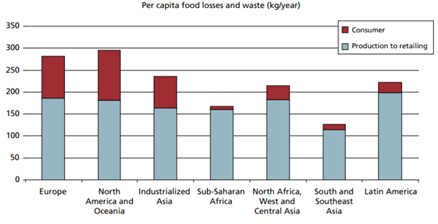Develop deeper customer relationships, proactively drive sustainability and guarantee a competitive advantage.
The circular economy, which aims to reduce the amount of waste by recycling and reusing raw materials and resources, is forecasted to be worth approximately £3.4tn by 2030. Progressive retailers are already adapting their business models to meet ethical and sustainable demands while maintaining a competitive edge. This latter point is important because the circular economy is not just about meeting standards, it provides an opportunity to redesign strategies, maximise technology, collaborate, and deliver more efficient supply chains, creating an entirely refreshed service. In turn, this approach contributes to deeper customer relationships, ensuring loyalty, new revenue streams and a competitive advantage on those operating soon-to-be antiquated business models.
The role of Organisations
Looking at industry statistics, the numbers speak for themselves. According to the European Commission, 88 million tonnes of food waste are generated every year in the EU alone, with associated costs of 143 billion euros. All stakeholders in the supply chain play their part in this phenomenon. From producers and processors to wholesalers and retailers, all the way through to the consumer. According to an FAO United Nations study, “food losses in industrialised countries are as high as in developing countries, but in developing countries more than 40% of the food losses occur at post-harvest and processing levels, while in industrialised countries, more than 40% of the food losses occur at retail and consumer levels. Food waste at consumer level in industrialised countries (222 million tonnes) is almost as high as the total net food production in sub-Saharan Africa (230 million tonnes).”

Organisations have the responsibility to improve their processes and culture to place sustainability at the heart of their operations. As such, some of the world’s largest supermarkets are delivering circular economy marketing campaigns to raise awareness for sustainability and speak more directly to their consumer’s changing behaviours. It is becoming a marketing battleground:
“Love your leftovers”
“Great taste less waste”
“Too good to waste”
Nevertheless, the reality is that while marketing and sales campaigns soar, it is a very different story when it comes to key corporate activities, such as supply chain decisions, logistics, and store and warehouse operations. 82% of CEOs state sustainability as a top priority, but change will continue to be slow unless initiatives are embedded at an operational level, with strategy as a guideline.
Circular Initiatives
As Deborah Dull of the Circular Supply Chain Network puts it, “The circular economy is based on three principles: design waste out, circulate materials and resources, and regenerate natural systems. The underlying premise behind the circular economy is that businesses that are strategically anchored in these three principles will be profitable, hedge their risk on raw material pricing, and add trillions to the global economy by 2030, by decoupling financial growth from limited natural resources historically required for growth.”
Design Waste Out: A Supply Chain Haven
Eliminating waste should be a key priority for producers and retailers. Through product reengineering, retailers and producers can reinvent their products by taking into analysis every component and material used. Tracing the environmental impact of each part can help in the decision to switch materials, or to give them a new life after the first application, eliminating single use as much as possible. In fact, 62% of consumers state that the environmental impact of product development is key in their purchasing decision.
The waste does not apply only to products and their components but also to how they are stocked, managed, and moved. Purchasing or production plans based solely on forecasting fail to adapt to the unpredictable customer demand. This results in warehouses overloaded with stocks, and high levels of shrinkage due to out of date or damaged products. An accurate demand forecasting model combined with having stock closer to consumers, helped a European retailer to reduce stock levels by 21%, while boosting sales by 20%.

In a recent improvement project, a major European retailer was able to reduce bakery waste by 4%, through the implementation of a complete logistics model. This included redefining stock levels and implementing a replenishment process based on real consumption, supported by a standardised route for high frequency material handling.
A big part of eliminating waste also lies on the consumer side. Educating the consumer on expiration dates and their meaning is a core priority for TooGoodToGo who work alongside retailers and producers such as Carrefour, Auchan, Nestle and Danone. Another good example is Sonae who created a programme for “single” bananas not to be thrown away with results of 20% reduction in product waste, simply through consumer awareness.
Circulate Materials and Resources: Recover and Recycle
Giving a new life to products and materials at the end of the supply chain is the epitome of a circular economy. Due to the linear nature of food production, for every dollar spent on food, society pays two dollars in health, environmental, and economic costs. The current food production model has been crucial to support the rapid population growth, but those do not contribute to a sustainable future.
Food by-products generated during processing can be reintroduced into the cycle in the form of organic fertiliser or by creating new food products. They can also be used in other industries such as in fashion for fabric production or as sources of bioenergy. To enable this, it is crucial that retailers and producers join forces to design clear, productive, and standard processes that allow for materials to circulate seamlessly in the supply chain.
Regenerate Natural Systems
“Leaving the planet better than we found it” is a core piece of the corporate strategy for those truly engaged retailers. This involves major business decisions such as shifting energy sources to clean ones or the use of biomaterials that still add value while composting. Dutch retailer Albert Heijn took this to a new level by building a supermarket store from only recycled and recyclable materials. Similarly, in Brazil, the sugar cane group Balbo, adopted new processes and machinery to allow for eco-friendly farming.
For this level of change to occur, not only does the corporate strategy need to be aligned but company culture needs to follow suit. It is crucial to educate teams on sustainability behaviours, so that they can also contribute to waste saving opportunities in their daily activities. This is a mindset shift that starts with the people.
Customer Obsession
These circular economy business models have been tried and tested at retailers across the world and the opportunity is obvious. Brand loyalty is increasingly scarce, but when companies show their initiatives, the modern customer’s affinity to that brand increases. Customer retention in retail has often been difficult, depending primarily on location and cost, but now customers are willing to travel farther and pay more for their supermarket, shops, and products of choice, based on their ethical standards.
Therefore, developing a deeper understanding of one’s customers and nurturing those relationships is increasingly important. The trick is developing relationships while managing your circular economy. Retailers who join this movement will create opportunities to understand their customers better and bring them into their circular economy strategy, from both product development and sales perspectives.
Amazon and Netflix gather a richer understanding of their consumers and are therefore more able to recommend personalised products or services, and this is not too dissimilar to the retail movement. By making the shift from transactional to deeper relationships, retailers can uncover new routes to market and personalise shopping experiences, both in-store and online. On top of this, digital platforms like Airbnb, Uber and Spotify coupled with things like urbanisation (ergo less storage space) are feeding the consumer shift towards access over ownership. Retailers are therefore developing new retail models based on leasing and product returns.
Beyond Retail
Companies outside of supermarket retailers are also doing more to become part of the movement.
- TooGoodToGo are the unicorn educating partners on food waste, improving in-store operations, and working with government agencies
- Takeaway giant UberEATS promised to deliver a zero emissions policy, which extends beyond their vehicles and into their restaurant partners and consumer households
- Coca-Cola have delivered their ‘This Is Forward’ programme, which has recycled over 30% of plastics, replenished 160% of stressed water and purchased 100% of energy from renewable sources.
- The UK Government are implementing cross-departmental sustainability objectives including tackling poverty, clean energy, sustainable cities, and responsible consumption.
- Pubs such as Greene King’s are offering customers a choice of meal sizes to reduce the amount of food left on plates.
Making Sustainability Stick
When it comes to daily operations, retailers are often focused on the short to medium term, but the circular economy must be a long-term objective. This means aligning the circular economy alongside sales, volumes, and margins to maintain the interest of key decision-makers.
Where should leaders start?
- Define your strategy from top management to department leaders, ensuring they are bought-in and ready to change. Deliver short to long-term targets that marry financial, consumer and ethical benefits
- Go all-in with your sustainability efforts from ethical sourcing to reducing CO2 emissions, to recyclable packaging to product innovation
- Communicate with your customers from advertisements to in-store practices that better portray your sustainability efforts while educating on green behaviours
- Measure your performance at an operational level and align the metrics with financial performance to engage decision-makers
#retail #strategy and leadership #sustainability
See more on Retail
Find out more about transformation in this sector
See more on Sustainability
Find out more about improving this business area
